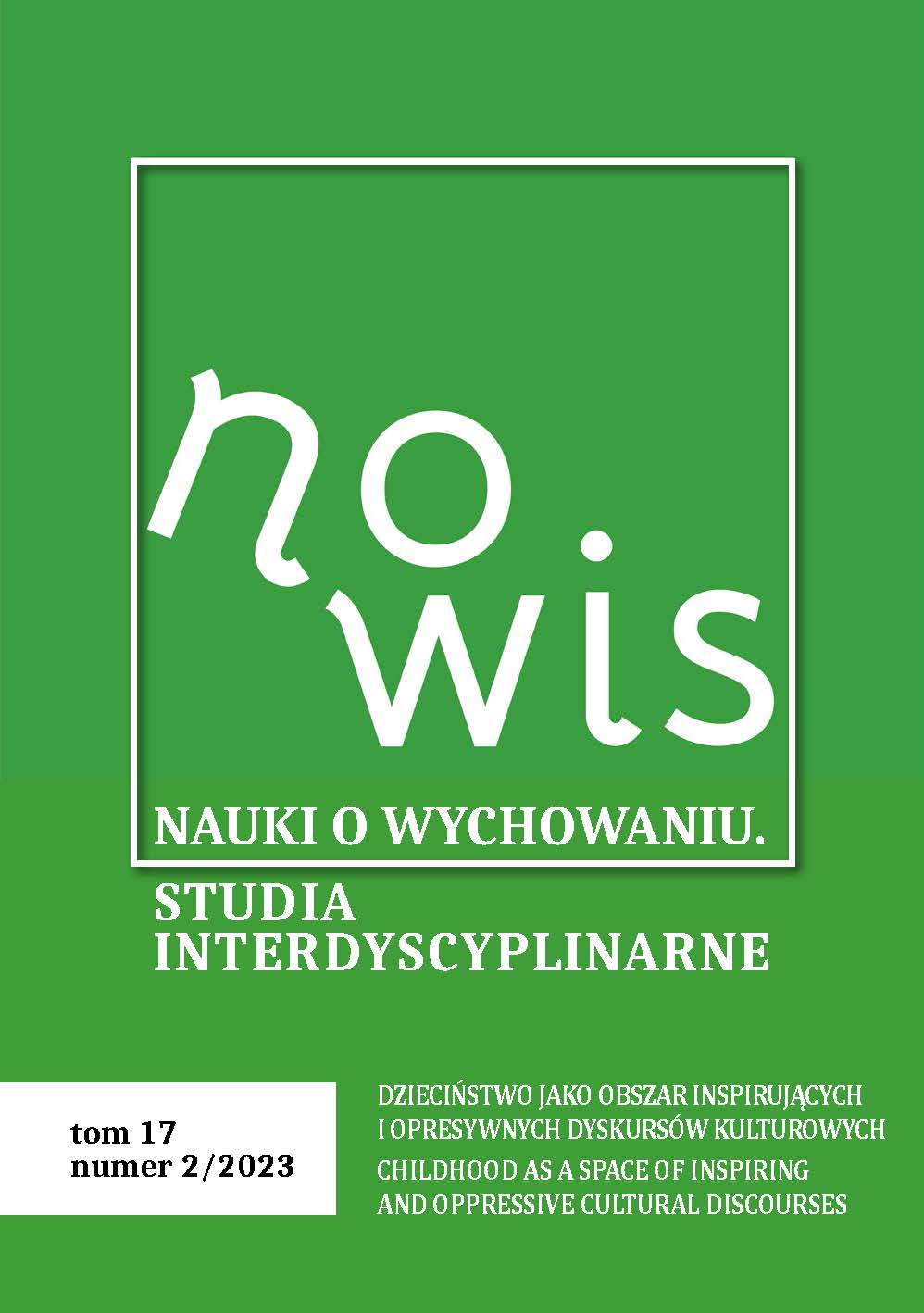Doświadczanie uczestnictwa w cyfrowej wspólnocie jako treść dziecięcej codzienności. Doniesienie z badań
DOI:
https://doi.org/10.18778/2450-4491.17.08Słowa kluczowe:
dziecko, studia nad dzieciństwem, codzienność dzieci, internet, e-kultura dziecięcaAbstrakt
W artykule opisane zostały badania, których celem było poznanie znaczeń, jakie dzieci nadają swojemu codziennemu uczestnictwu w cyfrowej wspólnocie. Zanurzenie dzieci w świecie online wywołuje bowiem od kilku dekad różne opinie osób dorosłych – od tych bardzo entuzjastycznych, aż po dalece alarmistyczne. Istotne jest natomiast – jak się wydaje – wsłuchiwanie w głos samych dzieci. Stwarza to szansę na wzniesienie się ponad poziom oceniania wpływów oddziaływania mediów na dzieci. Ponadto przybliża do poznawania tych przestrzeni, które kryją repertuar barwnych doświadczeń związanych z byciem dzieci w świecie online. Wykorzystano w tym celu wywiady fokusowe, w których wzięły udział dzieci w wieku 8–10 lat. Uzyskano obszerny materiał badawczy, który przeanalizowano zgodnie z sześcioetapową ramą analityczną według Virginii Braun i Victorii Clarke. Wśród najważniejszych wniosków można wskazać, iż aktywność internetowa wypełnia dziś w znacznym stopniu codzienność dzieci, a ich bycie online przeplata się naturalnie z byciem offline. Dzieci postrzegają internet jako źródło wielu możliwości i deklarują, że czują się w nim bezpieczne, ponieważ są świadomi zasad, jakimi trzeba się w nim kierować. Internet stwarza im przestrzeń do bycia razem i inicjowania wspólnie wielu aktywności. Dzieci doceniają wartość bezpośrednich kontaktów, które w ich odczuciu znacznie różnią się od tych zapośredniczonych przez technologie.
Bibliografia
Bougsiaa H., Cackowska M., Kopciewicz L., Nowicki T. (2016) Smartfon i tablet w dziecięcych rękach, Gdańsk, Wydawnictwo Naukowe KATEDRA.
Google Scholar
Braun V., Clarke V. (2006) Using Thematic Analysis in Psychology, “Qualitative Research in Psychology”, no. 2(3), pp. 77–101, http://dx.doi.org/10.1191/1478088706qp063oa
Google Scholar
DOI: https://doi.org/10.1191/1478088706qp063oa
Braun V., Clarke V. (2022) Thematic Analysis. A Practical Guide, Los Angeles – London – New Delhi – Singapore – Washington DC – Melbourne, Sage Publications.
Google Scholar
Brzozowska-Brywczyńska, M. (2021) Dzieci mają głos (?) – próba zmapowania form i praktyk dziecięcej partycypacji w Polsce, “Dziecko Krzywdzone. Teoria, badania, praktyka”, no. 20(3), pp. 12–36, [online:] https://dzieckokrzywdzone.fdds.pl/index.php/DK/article/view/816/664 (access: 05.01.2023).
Google Scholar
Buckingham D. (2008) Nowe media – nowe postaci dzieciństwa? Zmieniające się środowisko kulturowe dzieci w erze technologii cyfrowej in: Wprowadzenie do badań nad dzieciństwem, M. J. Kehily (ed.), trans. M. Kościelniak Kraków, Wydawnictwo WAM, pp. 151–169.
Google Scholar
Cantelmi T. (2015) Technopłynność. Człowiek w epoce Internetu: technopłynny umysł, trans. A. Laciuga, Kraków, Wydawnictwo OO. Franciszkanów “Bratni Zew”.
Google Scholar
Ciechowska M. (2017) Badania fokusowe in: Wybrane metody jakościowe w badaniach pedagogicznych, M. Ciechowska, M. Szymańska (eds.), part 1, Kraków, Akademia Ignatianum w Krakowie and Wydawnictwo WAM, pp. 101–163.
Google Scholar
Clément T., Buckingham D. (2019) Some Reflections on Children’s Media Cultures: An Interview with David Buckingham, “Transatlantica”, no. 2, https://doi.org/10.4000/transatlantica.15152
Google Scholar
DOI: https://doi.org/10.4000/transatlantica.15152
Corsaro W. A. (2015) The Sociology of Childhood, Los Angeles – London – New Delhi – Singapore – Washington, D. C., Sage Publications.
Google Scholar
Donoso V., Pyżalski J., Walter N., Retzmann N., Iwanicka A., d’Haenens L., Bartkowiak K. (2021) ySkills: Report on Interviews with Experts on Digital Skills in Schools and on the Labour Market, KU Leuven, Leuven: ySKILLS, https://doi.org/10.5281/zenodo.5226910
Google Scholar
Dziekońska J. (2020) Kultura dziecięca w internecie. Studium netnograficzne, Olsztyn, Wydawnictwo Uniwersytetu Warmińsko-Mazurskiego w Olsztynie.
Google Scholar
Esser F., Baader M., Betz T., Hungerland B. (eds.) (2016) Reconceptualising Agency and Childhood: New perspectives in Childhood Studies, New York, NY, Routledge, https://doi.org/10.4324/9781315722245
Google Scholar
DOI: https://doi.org/10.4324/9781315722245
Iwanicka A. (2020) Cyfrowy świat dzieci we wczesnym wieku szkolnym, Poznań, Wydawnictwo Naukowe UAM.
Google Scholar
James A., Prout A. (1997) Preface to Second Edition in: Constructing and Reconstructing Childhood: Contemporary Issues in the Sociological Study of Childhood, A. James, A. Prout (eds.), London – Washington, D. C., Falmer Press, pp. 9–17.
Google Scholar
Kehily M. J. (2008) Wprowadzenie do badań nad dzieciństwem, trans. M. Kościelniak, Kraków, Wydawnictwo WAM.
Google Scholar
Kenway J, Bullen E. (2001) Consuming Children: Education-Entertainment-Advertising, Buckingham, Open University Press.
Google Scholar
Kowalik-Olubińska, M. (2020) Interdyscyplinarny paradygmat “Childhood Studies” w perspektywie konstrukcjonizmu, “Problemy Wczesnej Edukacji”, no. 51(4), pp. 126–137, https://doi.org/10.26881/pwe.2020.51.10
Google Scholar
DOI: https://doi.org/10.26881/pwe.2020.51.10
Kowalik-Olubińska M. (2021) Dzieci aktorami w przestrzeniach życia społecznego. Sprawczość w sieci relacji, Toruń, Wydawnictwo Edukacyjne “Akapit”.
Google Scholar
Kubinowski D. (2011) Jakościowe badania pedagogiczne. Filozofia – Metodyka – Ewaluacja, Lublin, Wydawnictwo UMCS.
Google Scholar
Lansdown G. (2001) Promoting Children’s Participation in Democratic Decision-Making, Florence, UNICEF.
Google Scholar
Lisek-Michalska J. (2013) Badania fokusowe. Problemy metodologiczne i etyczne, Łódź, Wydawnictwo Uniwersytetu Łódzkiego, https://doi.org/10.18778/7525-896-7
Google Scholar
DOI: https://doi.org/10.18778/7525-896-7
McCrindle M., Fell A. (2021) Generation Alpha: Understanding Our Children and Helping Them Thrive, Norwest NSW, Hachette UK.
Google Scholar
Qvortrup J., Corsaro W. A., Honig M.-S. (red.) (2009) The Palgrave Handbook of Childhood Studies, Basingstoke, Palgrave Macmillan, https://doi.org/10.1057/9780230274686
Google Scholar
DOI: https://doi.org/10.1057/9780230274686
Rowicka M., Bujalski M. (2020) Raport z badania: “Brzdąc w sieci – zjawisko korzystania z urządzeń mobilnych przez dzieci w wieku 0–6 lat”, Akademia Pedagogiki Specjalnej im. Marii Grzegorzewskiej, https://twojasprawa.org.pl/file/e5f1f74a-0b05-11ec-abb0-0022480e68c2 (access: 05.01.2023).
Google Scholar
Siwicki M (2021) Nowe podwórka współczesnego dzieciństwa, Warszawa, Wydawnictwo Akademii Pedagogiki Specjalnej im. Marii Grzegorzewskiej.
Google Scholar
Turkle S. (2013) Samotni razem. Dlaczego oczekujemy więcej od zdobyczy techniki, a mniej od siebie nawzajem, trans. M. Cierpisz, Kraków, Wydawnictwo Uniwersytetu Jagiellońskiego.
Google Scholar






 Strona czasopisma, prowadzona przez Zespół redakcyjny NOWiS na platformie Index Copernicus:
Strona czasopisma, prowadzona przez Zespół redakcyjny NOWiS na platformie Index Copernicus: 





